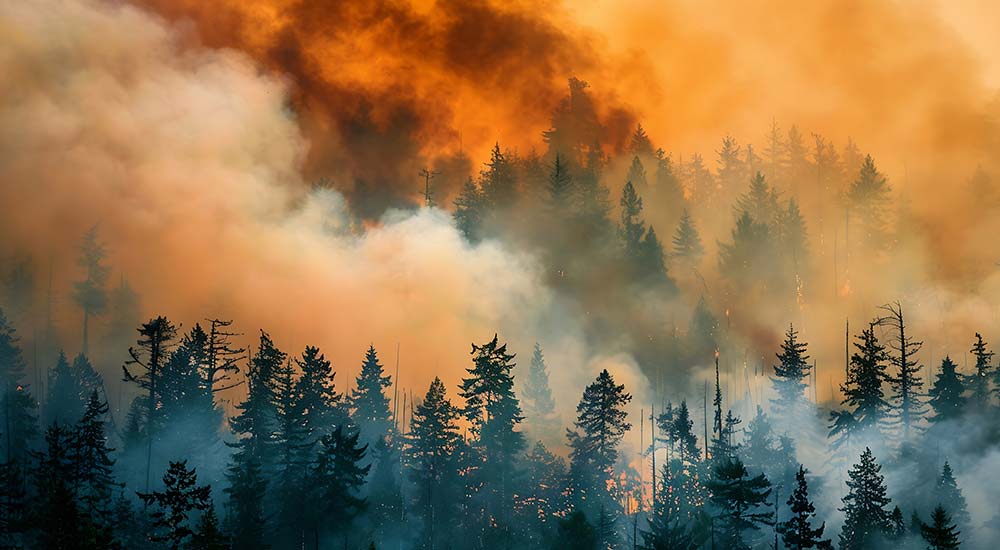Key Facts About Wildfires and Insurance

Imagine it's a typical summer afternoon in the heart of the business district. Imagine it's a typical summer afternoon in the heart of the business district. The sun is shining, and the streets are bustling with activity. Suddenly, the sky darkens as smoke billows from the nearby hills.
A wildfire has ignited, threatening the safety of businesses and properties in its path. As the flames get closer, business owners rush to protect their assets before escaping to safety.
Wildfires can strike with little warning, leaving devastation in their wake. As a business owner, understanding the risks to your business is crucial.
This article shares important facts about wildfires. It also gives helpful tips to protect your business and recover afterward. With the right insurance coverage, you can make sure your business is protected and ready to face the challenges posed by wildfires.
Does My Business Need Coverage for Wildfires Risk?
To decide if you need business wildfire insurance, consider a few factors. These include where your business is located, how often wildfires happen nearby, and how they could affect your operations. The National Interagency Fire Center says that in 2022, over 58,000 wildfires occurred in the U.S. These fires burned more than 10 million acres.
If your business is in a region prone to wildfires, it's crucial to assess the risk and ensure you have adequate coverage. Consult with your Main Street America insurance agent to discuss your specific needs and explore options for comprehensive protection.
How Do I Know If My Business is Insured Against Wildfires?
Review your current insurance policy documents to determine if your business is insured against wildfires. Look for coverage details related to fire damage, business interruption, hazard insurance, and property protection. If you're unsure, reach out to your insurance agent for clarification and to discuss additional coverage options that may be needed to fully protect your business.
How Much Does Wildfire Insurance for My Business Cost?
The cost of wildfire insurance for your business can change a lot. This depends on several factors.
Your business location is a key factor. The risk level in your area is important too. The size and type of your business also play a role. Finally, the coverage options you choose will affect your situation.
Businesses located in high-risk areas may face higher premiums due to the increased likelihood of wildfire damage. The value of your property and assets can also affect the total cost. Extra endorsements or coverage options can also play a role.
To get an accurate estimate, it's best to consult with your Main Street America insurance agent. They can give you a detailed quote based on your situation. They will help you find options for complete protection at a competitive rate.
If My Business Closes Due to a Wildfire, What Happens Next?
If your business is forced to close because of a wildfire, your insurance policy may include business interruption coverage. This coverage can help compensate for lost income and assist with ongoing expenses during the closure period. It's important to contact your insurance agent promptly to file a claim and begin the recovery process. They can guide you through the necessary steps to ensure you receive the support you need.
What Steps Can I Take to Prepare for Wildfire Season?
Preparing for wildfire season involves proactive measures to safeguard your business. Start by reviewing our business wildfire checklist, which includes steps like clearing vegetation around your property, maintaining emergency supplies, and establishing an evacuation plan. Additionally, consult a wildfire risk map by ZIP code to understand the specific risks in your area.
What are Some Common Coverage Gaps When It Comes to Wildfires?
Common coverage gaps related to wildfires may include insufficient business interruption coverage, lack of protection for outdoor assets, and inadequate coverage for smoke damage. It's essential to review your policy thoroughly and discuss potential gaps with your insurance agent. They can help identify areas where additional coverage may be beneficial, ensuring your business is fully protected against wildfire risks.
Wildfire Aftermath: What to Expect
Once the fire is out, the recovery process begins. Here’s what you can expect in the aftermath of a wildfire. Recovering from a wildfire can be a challenging process, but these tips can help you get back on your feet.
Ensure Safety First
Safety should be your top priority. Before returning to your property, ensure it is safe to enter. Look out for:
- Structural Damage: Check for weakened structures that might collapse.
- Hazardous Materials: Be aware of chemicals or other dangerous substances that may have been released during the fire.
- Utility Checks: Ensure that utilities such as gas, electricity, and water are safe to use.
Insurance Claims
Contact your insurance agent as soon as possible to report the damage. Make sure to share your documentation as noted above. They can help begin the process to file a claim.
Next, we'll typically work with you to assess the damage. This may involve inspecting your property for structural damage, checking for hazardous materials, and evaluating the overall impact on the community.
Clean-Up and Restoration
Cleaning up after a wildfire is a daunting task, but it is essential for recovery. Start by removing debris and hazardous materials. This may require professional help, especially for handling toxic substances.
Fire damage can be extensive, affecting both the interior and exterior of properties. Here are some steps to address it:
- Smoke and Soot Removal: Clean surfaces to remove smoke and soot. Specialized cleaning products may be necessary.
- Odor Elimination: Use deodorizers and air purifiers to eliminate lingering smoke odors.
- Water Damage: Address any water damage caused by firefighting efforts to prevent mold and mildew.
Rebuilding and Preparing for the Future
When rebuilding, consider using fire-resistant materials and implementing landscaping techniques that reduce fire risk, such as creating defensible space around your property.
Wildfires are a formidable natural disaster with far-reaching consequences. Understanding the factors that contribute to wildfires and their impact can help communities better prepare and recover.
Remember, recovery is a process that takes time and effort. With the right approach and support, you can rebuild and emerge stronger from the experience.

